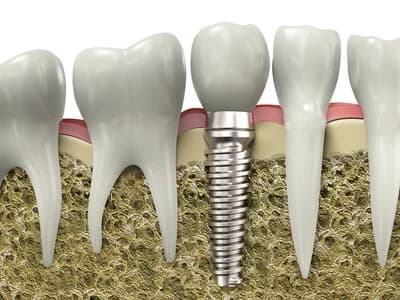Dental Implants: When is a bone graft recommended?

Inadequate bone tissue can present an obstacle to patients who want to get dental implants. The key to dental implant durability is the bond that forms between the bone and the titanium implant. That bond helps to make the implant a permanent fixture in the mouth. When the patient has already experienced bone loss, which typically follows tooth loss, there may not be enough bone present to support that osseointegration. This is of particular concern to patients who have waited for some time to replace missing teeth after the initial tooth loss—such as long-term denture wearers.
Nonetheless, such bone loss may not permanently disqualify a patient from getting dental implants. To improve the chances of long-term implant success, an implant dentist may recommend a bone graft prior to implant placement.
In performing a bone graft, the implant dentist will take bone from elsewhere in the body or from some other donor source, such as a cadaver or artificial materials, and insert it at the implant site. After the patient has healed sufficiently from that initial procedure, the implant dentist can then proceed with dental implant placement.
Advances in dental implant technology and surgical techniques have improved outcomes for many patients that have already suffered from some bone loss, but the implant dentist still may recommend a bone graft if there is concern about the long-term stability of the devices. Some patients may have qualms about adding another surgical procedure to the process and extending the treatment timeline, but the efforts are worthwhile if they allow the patient to maximize the lifespan of the dental implants.
Most patients view dental implants as a permanent solution to tooth loss, and to achieve that outcome, an implant dentist may need to perform an initial bone graft before placing the dental implants. The implant dentist will discuss this with you during the treatment planning process.
For more information, contact Charlottesville Oral Surgery & Dental Implant Center at 434-295-0911 and schedule your informative consultation.